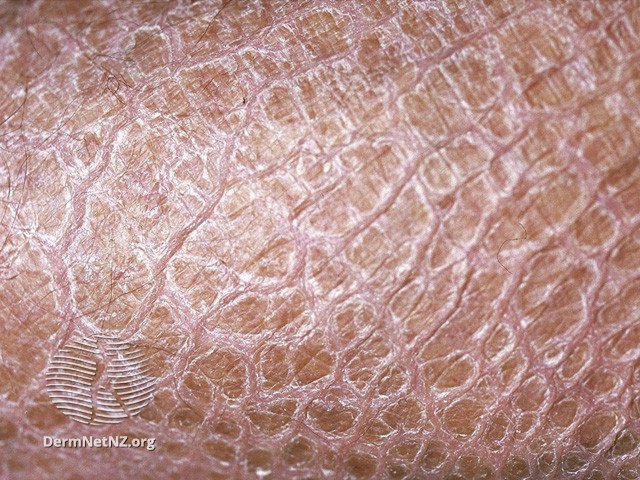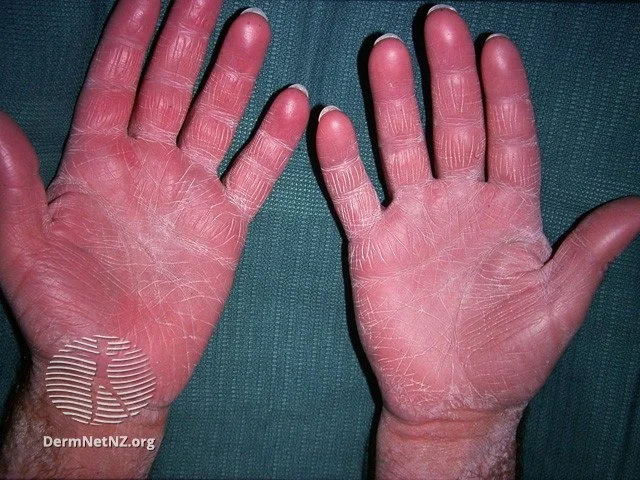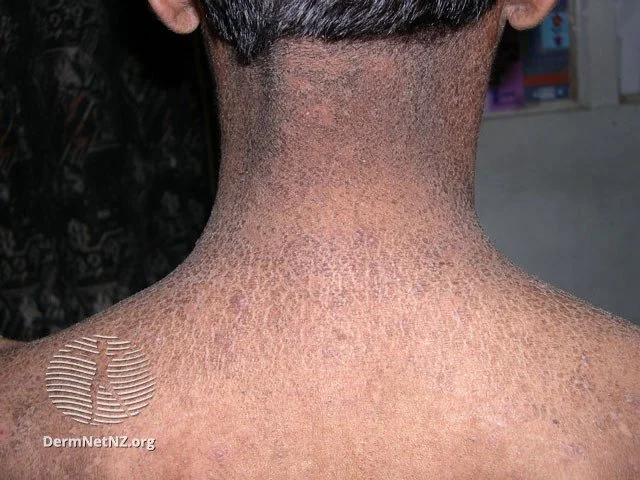
Ichthyosis
An example of ichthyosis, which appears as dry, “fish-like” scaling and cracking, most commonly on the legs and arms.
Credit: DermNet NZ
What is ichthyosis?
Ichthyosis is a term derived from the Greek word for fish, aptly describing a set of skin disorders that yield dry, thickened, and often scaly skin, reminiscent of fish scales. While mild cases might seem just like dry skin, severe instances can have intense ramifications, extending to fatal outcomes in extreme situations.
What causes ichthyosis?
Ichthyosis predominantly roots from genetic anomalies. Such genetic variations can transform the behavior of skin cells, particularly in inherited forms like ichthyosis vulgaris. A noticeable upsurge in inflammatory cells and chemicals in the skin seems to play a role in manifesting the symptoms of the disease. Acquired ichthyosis, on the other hand, might emerge without discernible reasons. However, it's occasionally associated with conditions like lymphoma, thyroid diseases, sarcoidosis, HIV, and certain cancers, or can be a side effect of some medications.
What are the symptoms of ichthyosis?
Symptoms of ichthyosis aren't universally consistent; they differ depending on its specific type. Commonly observed across all forms is the dry, scaly skin. Yet, the spectrum of symptoms can include:
Keratosis pilaris: Small, skin-colored bumps
Potential association with eczema
Skin that's inflamed and reddened
Instances of dark scaling in contrast to light
Vision challenges
Skin susceptibility to blistering or infections, including conditions like cellulitis
Severe cases might showcase droopy eyelids, everted lips, or rigidity in tissues or joints
A predisposition to overheating due to skin's inability to perspire effectively
How do I treat ichthyosis?
Although ichthyosis lacks a definitive cure, various treatments can alleviate its symptoms:
Use non-soap cleansers to maintain skin's natural oils
Engage in salt water baths, which can help in hydrating the skin
Use tools or treatments that aid in exfoliating and scaling off dead skin
Apply creams infused with keratolytic agents, such as urea, salicylic acid, or alpha hydroxy acids, to break down the scales
For severe manifestations, oral retinoids like acitretin and isotretinoin can be effective
If secondary bacterial infections develop, oral antibiotics might be prescribed
Vitamin D supplements can aid in skin health and function
Icthyosis can cause hyperlinearity (increased markings) on the palms.
Credit: DermNet NZ
Icthyosis can resemble severely dry skin on the body.
Credit: DermNet NZ



